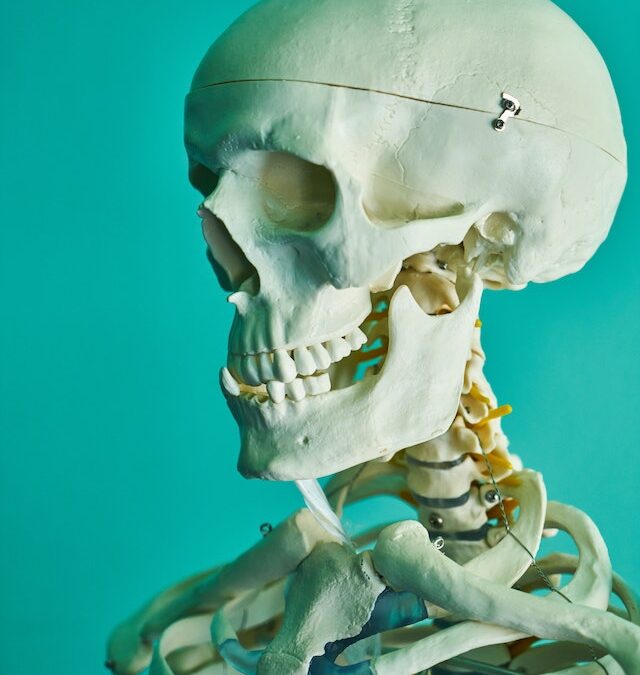
by Tanya Keam | May 10, 2023 | Acupuncture, Chinese medicine, Client information, Health practitioner, Jaw pain, Mental health, Muscle pain, Nambour, Private health, Rehabilitation, Sleep, Stress, Sunshine coast, TMJ, Wellness
Acupuncture for TMJ
What is TMJ?
TMJ stands for Temporo-Mandibular Joint. The TMJ is the joint that connects the jaw to the skull. These joints are involved in eating, facial movements and speech. Let’s get into how Acupuncture for TMJ pain can be helpful.
What is TMJ pain?
Pain that can feel grinding in the jaw, that if left untreated can lead to inability to chew properly, ear pain, migraine, headache, lack of sleep, tooth pain, lockjaw, dizziness, anxiety and joint noises such as cracking or popping of the jaw.
What are the symptoms you might experience from TMJ pain?
- Inability to chew food properly
- Ear pain or ear ache
- Insomnia
- Tooth ache
- Locked jaw
- Headache
- Migraine
- Mood dosorders
- Neck pain
- Dizziness
- Vertigo
How can TMJ be diagnosed?
Diagnostic tests may include:
- Xray
- MRI
- CT scan
- Physical exam by a general physician, physical therapist or other allied health professional if you are presenting with persistent jaw pain
Available treatment options for TMJ pain
- Exercises to relax or strengthen the muscles of the jaw
- Dental splints to reduce tooth grinding at night
- Dental alignment
- Stress management
- Soft tissue release to relax muscle tension in the jaw
- Diet changes such as increasing omega’s to reduce systemic inflammation such as arthritis, autoimmune or connective tissue conditions
- Pharmaceutical pain relief
- Herbal medicine
- Acupuncture
- Physical therapy
By the time a person seeks treatment, TMJ is often at its chronic stage so it does take time to treat it and using more than one type of approach would give a person a better outcome.
For example: managing stress so that a person does not grind their teeth at night thus reducing the need for a dental splint, improving diet to align with low to no inflammation in the body and seeking treatment from a qualified therapist to assist soft tissue release such as having acupuncture or having dental procedures to correct jaw and tooth alignment.
Acupuncture for TMJ:
Acupuncture therapy has been around for centuries and is often known to be able to treatment painful conditions. Aside from dental causes of TMJ, the majority of cases can be seen as a deep route of underling stress which therefore causes tension on the neck, jaw and temporal muscles of the skull. Exacerbated tension leads to exacerbated pain. The added benefits of chinese herbal medicines, diet and lifestyle advice alongside the acupuncture therapy, people can have lasting results in treating TMJ.
Current research findings for Acupuncture for TMJ:
- Acupuncture to have a positive effect in the treatment of pain associated with TMJ compared to the control groups (3).
- A 2010 study showed acupuncture treatment of TMJ achieved immediate effect in pain and showed ongoing positive effects after a treatment regime over 8 – 10 weeks of treatment (1).
- A 2012 study showed pain intensity was less in the trigger point acupuncture group than in the sham (fake acupuncture) treatment group, pain intensity decreased significantly between pretreatment and after 5 weeks, and trigger point acupuncture therapy may be more effective for chronic TMJ myofascial pain (2).
- A 2014 study showed laser acupuncture therapy improves the symptoms of treatment-resistant TMD. Further studies with a more appropriate designs specific for laser acupuncture are needed (5), however a review of acupuncture randomised control trials (3) found acupuncture showed promising results in the management of TMJ symptoms (4).
If you are suffering from TMJ pain please contact us today to discuss how we can help you at our Nambour Acupuncture clinic in the Sunshine Coast hinterland.
Hi, I’m T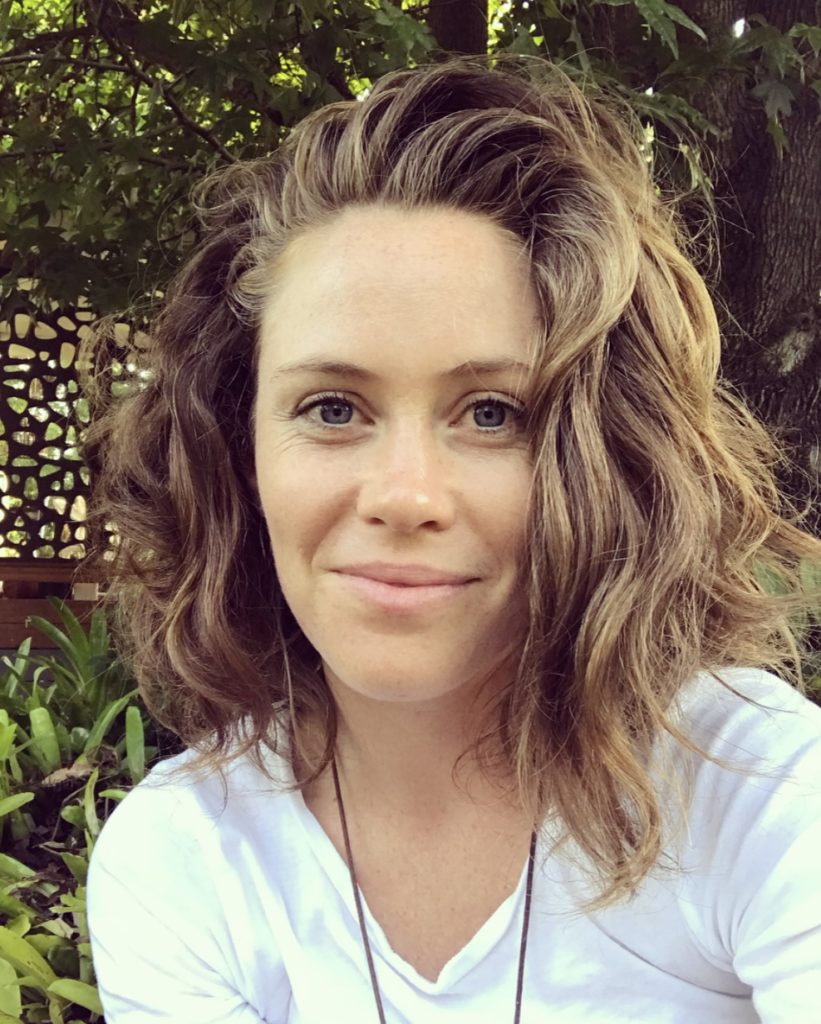 anya, an AHPRA registered Acupuncturist and health practitioner in Nambour in the Sunshine Coast hinterland, Queensland Australia. I practice Chinese medicine because its safe, logical, relevant and has effectively shown methods of natural wellness for thousands of years (read more about my training here). Life doesn’t need to be complicated and nor does the treatment approaches to get people feeling vibrant and well. I’ve seen people gain a lot from treatments, much more than just alleviating symptoms. It’s exciting to connect with people and share deep wisdom from the classics of ancient and traditional medicine, with modern protocols for todays mind-body living. See you in the clinic !
anya, an AHPRA registered Acupuncturist and health practitioner in Nambour in the Sunshine Coast hinterland, Queensland Australia. I practice Chinese medicine because its safe, logical, relevant and has effectively shown methods of natural wellness for thousands of years (read more about my training here). Life doesn’t need to be complicated and nor does the treatment approaches to get people feeling vibrant and well. I’ve seen people gain a lot from treatments, much more than just alleviating symptoms. It’s exciting to connect with people and share deep wisdom from the classics of ancient and traditional medicine, with modern protocols for todays mind-body living. See you in the clinic !
References :
- Acupuncture for Treating Temporomandibular Disorder: Retrospective Study on Safety and Efficacy: Garty Adriel, Maimon Yair, Miller Udi; Acupunct Meridian Stud 2010
- Effects of trigger point acupuncture treatment on temporomandibular disorders: a preliminary randomized clinical trial: Kazunori Itoh, Sayo Asai, Hideaki Ohyabu, Kenji Imai, Hiroshi Kitakoji; Epub 2012
- Acupuncture therapy in the management of the clinical outcomes for temporomandibular disorders A PRISMA-compliant meta-analysis: Jun-Yi Wu, MD,Chao Zhang, MD, Yang-Peng Xu, MM, Ya-Yu Yu, MD,Le Peng, PhD, Wei-Dong Leng, PhD,Yu-Ming Niu, PhD, and Mo-Hong Deng, PhD
- Acupuncture for Temporomandibular Disorders: A Systematic Review: Seung-Hun Cho KMD PhD, Wei-Wan Whang KMD PhD.
- Clinical effectiveness of laser acupuncture in the treatment of temporomandibular joint disorder: Yu-Feng Huang, Jung-Chih Lin, Hui-Wen Yang, Yu-Hsien Lee, Chuan-Hang Yu; Epub 2014
- https://www.mayoclinic.org/diseases-conditions/tmj/symptoms-causes/syc-20350941

by Tanya Keam | Jan 24, 2023 | Acupuncture, Adrenal Fatigue, Anxiety, Authentic self, Chinese medicine, Chronic fatigue, Daily Rituals, Exercise, Mental health, Nambour, Self care, Sleep, Spiritual growth, Stress, Sunshine coast
What is self care ?
You might think having a relaxing bath and exercising is self care, and it is. However self care for everyone is going to be different and there are many ways to take care our wellbeing.
Checking in with yourself to see how you are is a good place to start. Sitting down for 15 minutes, closing your eyes and focussing on your breathing will tell you if you’re conscious of your breathing or not. People often find it difficult to meditate so if this is you, just sitting or lying down and focussing on your breathing is a start. Inhale for 4 counts and exhale for 4 counts continually for 15 minutes. If this is difficult then start with 5 minutes. Does the inhalation feel the same as the exhalation? Or does one feel more restricted than the other?
Once here, ask yourself how you are.
What emotions are present right now? Have I been sleeping well lately? What has been upsetting me lately? Do I feel well in my body – my energy stamina, my digestion, do I have pain in my body? How have the last 3 months been going? The past year? How do I take care of my well being? Do I take care of myself at all? Do I reach for things to change how I feel? A glass of wine, substances? How do I handle stress?
As a Eastern medicine practitioner in the health industry I often ask people how they take care of themselves day to day and also when they aren’t feeling good.
Self care ideas you maybe haven’t thought of:
- Saying no to social events because you’re not up to it
- Calling friends to be around people you love for company
- Doing food prep so you have healthy meals through the week
- Asking a friend to help you with something
- Getting help with kids so you can have a few hours to yourself
- Seeing a therapist to talk about things
- Exercising every day to get the feel good chemicals going in your body
- Reducing your work or study load
- Taking time off work
- Resting at home – literally putting your feet up with a book
- Sleep
- Stepping away from unhealthy relationships or jobs
- Allowing yourself to cry and feel
- Magnesium bath
- Time in nature
- Taking a holiday
- Being conscious of your behaviours when you are stressed
- Prayer
- Meditation
- Doing your favourite hobbies
- Conscious breathing
- Staying off social media if peoples highlight reels are triggering
- Journaling
- Trying a new activity
- Asking for help
- Quiet days at home
- Going for a health treatment such as acupuncture to balance your nervous system
- Reducing or completely removing alcohol and substances
- Slowing your life down, simplifying things
Life can get on top of us sometimes. Checking in with yourself every day by practicing self care is loving yourself. Your self care isn’t going to look the same as someone else’s self care but know there are many ways to nourish your body, mind and spirit. Give yourself time and space to move through things that are happening in your life.
 Hi, I’m Tanya Keam, an AHPRA registered Acupuncturist and natural health practitioner in Nambour in the Sunshine Coast hinterland, Queensland Australia. I practice Chinese medicine and Acupuncture because its safe, logical, relevant and has effectively shown methods of natural wellness for thousands of years (read more about my training here). Life doesn’t need to be complicated and nor does the treatment approaches to get people feeling vibrant and well. I’ve seen people gain a lot from treatments, much more than just alleviating symptoms. It’s exciting to connect with people and share deep wisdom from the classics of ancient and traditional medicine, with modern protocols for todays mind-body living. If you need some guidance in practicing better self care get in touch or book online today.
Hi, I’m Tanya Keam, an AHPRA registered Acupuncturist and natural health practitioner in Nambour in the Sunshine Coast hinterland, Queensland Australia. I practice Chinese medicine and Acupuncture because its safe, logical, relevant and has effectively shown methods of natural wellness for thousands of years (read more about my training here). Life doesn’t need to be complicated and nor does the treatment approaches to get people feeling vibrant and well. I’ve seen people gain a lot from treatments, much more than just alleviating symptoms. It’s exciting to connect with people and share deep wisdom from the classics of ancient and traditional medicine, with modern protocols for todays mind-body living. If you need some guidance in practicing better self care get in touch or book online today.
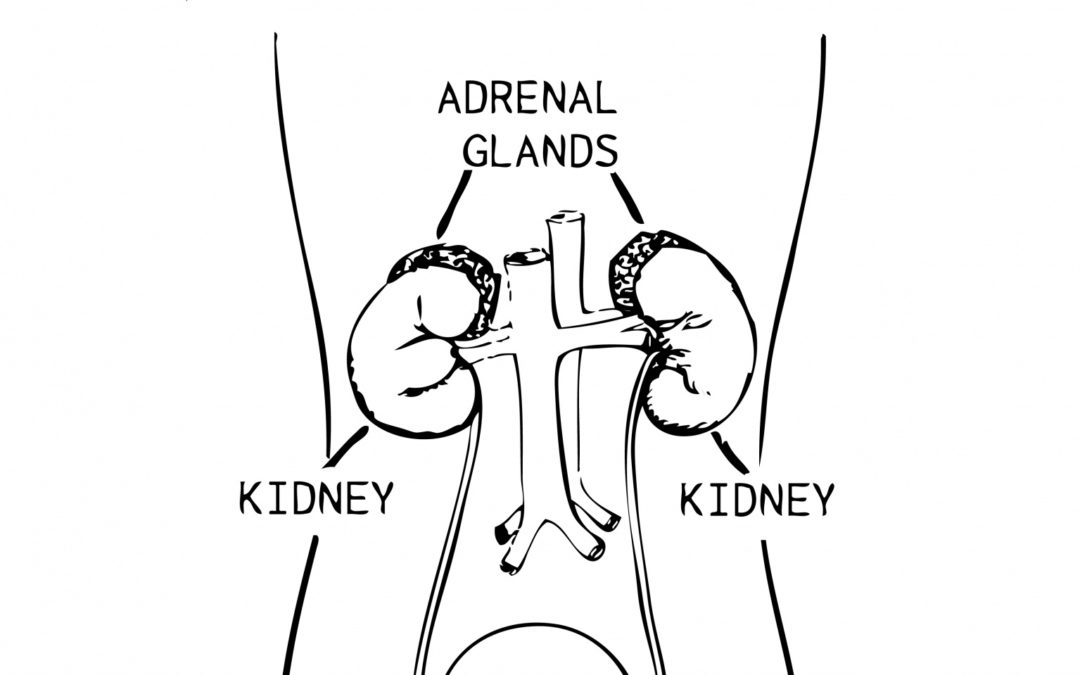
by Tanya Keam | Apr 6, 2021 | Acupuncture, Adrenal burnout, Adrenal Fatigue, Chinese medicine, Chronic fatigue, Client information, Daily Rituals, DIY Wellness Tips, fertility acupuncture, Health practitioner, Mental health, Nambour, Sunshine coast
What is Adrenal Fatigue?
The Adrenal glands belong to the Endocrine System where they produce a variety of hormones that are essential to life. The medical term “Adrenal Insufficiency” is an inadequate production of one or more of these hormones as a result of underlying conditions. Whereas, Adrenal Fatigue isn’t an accepted medical diagnosis, it is thought that adrenal fatigue is caused by stress on the body where the adrenal glands cannot cope with the constant pace of fight-or-flight (sympathetic) nervous system response. adrenal fatigue acupuncture sunshine coast
tSigns and symptoms of adrenal insufficiency:
- Fatigue
- Body aches
- Unexplained weight loss
- Loss of body hair
- Skin discolouration
- Lightheadedness
- Low blood pressure
- Low production of hormones
Diagnosis for adrenal insufficiency can be tested to show inadequate levels of adrenal hormones.
In Traditional Chinese Medicine, adrenal fatigue is burnout. The kidney is the organ that stores our vital energy called Qi. We are all born with varying amounts of energy based on genetics, this is called out ancestral energy. This energy manages our reproduction, ageing, vitality and emotional-physical endurance. The day to day living of healthy food, exercise, relationships, environment and work/life balance is what maintains the kidney energy.
The less ancestral and vital kidney force you have (based on your lifestyle and if you’re over doing it), the sooner the chance of adrenal burnout. Chipping away at the kidney qi from too much stress, working too much without rest, living in the fight-or-flight (sympathetic) nervous system response WILL lead to adrenal burnout. When burn out is not addressed or the body is under continual strain over many years, there is a place that we cannot come back from. This leads to chronic health problems and the biggest symptom is long-term fatigue (exhaustion). The body is remarkable its in communication. Symptoms tell us something is wrong!
General fatigue can come and go, so having a holiday or some restful days off usually helps you to feel better naturally. Even having a blood test to check on a few things (such as iron levels) might be a simple explanation of fatigue. Adrenal fatigue however doesn’t just happen over night. It takes months or more of stress and over doing it to reach a point where the adrenal glands can’t keep going under pressure.
Traditional Chinese Medicine diagnoses adrenal fatigue based on multiple symptoms in relation to the energy of the kidney system. These can include :
- Fatigue and/or exhaustion
- Needing to sleep during the day after 8 hours of sleep at night
- Relying on coffee for energy
- Body aches
- Lower back pain
- Muscle weakness
- Lightheadness
- Shortness of breath
- Feel worse after exercise
- Loss of body hair or hair falling out
- Lack of concentration, focus or recall
- Low blood pressure
- Slow pulse rate
- Decreased libido
- Difficulty falling pregnant
- Thyroid imbalance
- Getting sick often or taking a long time to recover from illness
- Low blood sugar symptoms
- Waking early in the morning regularly at 4am
- Craving salty foods
- Emotional and mental instability such as anxiety
How does Traditional Chinese Medicine support someone with adrenal fatigue?
- Seeing a registered Acupuncturist allows you to receive the correct type of treatment based on their qualifications and experience. Adrenal fatigue acupuncture sunshine coast.
- Traditional acupuncture stimulates the internal healing response in the body to help the nervous system self regulate.
- Herbal medicine is prescribed based on the individual patient to support the energetics of the kidney and adrenal health.
- Moxibustion is a heat therapy used with acupuncture to further strengthen and support the bodies healing response.
- Correcting nutritional and mineral deficiencies to support optimal health.
- Lifestyle recommendations to support where the person is at. They may need a referral to a therapist to talk and gain some strategies to help cope with the demands that lead to adrenal burn out. Or something simple like gentle yoga exercises and breathing techniques to connect mind and body again. Life can get on top of you sometimes, so seeing a health practitioner, talking with someone close to you or a professional might be helpful.
What does rest look like?
- Sleep and naps during the day
- Time in nature
- Health treatments – having someone take care of you to rebalance your system
- Setting boundaries and changes to work-life balance
- Time off work
- Doing one thing at a time such as solely watching a movie, while you’re not on your phone or multitasking other things at the same time
- Laying down, putting your feet up with a book
- Time away from electronics and notifications from smart phones
- Asking for help
- Taking a holiday away from your regular environment
- Sitting down to eat, chew slowly, consciously taste and enjoy the food
- Gentle exercises to connect mind and body such as meditation, yoga, tai chi, qi gong, walks in nature all support the parasympathetic nervous system
To maintain the ancestral energy, we need to take care of ourselves with healthy food, exercise, quality sleep, managing stress and most importantly learning to rest.
If you are suffering from fatigue or you believe you may have adrenal fatigue please contact us today to discuss how we can help your adrenal fatigue at our Acupuncture clinic on the Sunshine Coast.
 Hi, I’m Tanya, an AHPRA registered Acupuncturist and health practitioner in Nambour in the Sunshine Coast hinterland, Queensland Australia. I practice Chinese medicine because its safe, logical, relevant and has effectively shown methods of natural wellness for thousands of years (read more about my training here). Life doesn’t need to be complicated and nor does the treatment approaches to get people feeling vibrant and well. I’ve seen people gain a lot from treatments, much more than just alleviating symptoms. It’s exciting to connect with people and share deep wisdom from the classics of ancient and traditional medicine, with modern protocols for todays mind-body living. See you in the clinic !
Hi, I’m Tanya, an AHPRA registered Acupuncturist and health practitioner in Nambour in the Sunshine Coast hinterland, Queensland Australia. I practice Chinese medicine because its safe, logical, relevant and has effectively shown methods of natural wellness for thousands of years (read more about my training here). Life doesn’t need to be complicated and nor does the treatment approaches to get people feeling vibrant and well. I’ve seen people gain a lot from treatments, much more than just alleviating symptoms. It’s exciting to connect with people and share deep wisdom from the classics of ancient and traditional medicine, with modern protocols for todays mind-body living. See you in the clinic !

by Tanya Keam | Aug 5, 2019 | Acupuncture, Chinese medicine, Client information, Emotions, Health practitioner, Herbal remedies, Mental health, Nambour, Rehabilitation, Spiritual growth, Sunshine coast, Wellness
I’ve been having conversations with new and long term Sunshine Coast patients recently about what makes them decide to go see a certain health practitioner over another.
What’s the stats?
- 80% say they’ll ask a friend if they know of someone because they trust that person has had a positive experience
- 10% do a quick google search for who is local and available NOW
- The other 10% just plod on and try to figure it out and hope it all gets better. (I’m sure we’ve all been in each percentage for different things at different times).
Last week a semi-new patient returned for a monthly appointment. She was telling me about her 2 colleagues at work who also suffered migraines (which was this patients main complaint that’s now been resolved from treatment). One of the colleagues was just at her wits end with constant migraines, not knowing where to turn that she is now taking stress leave from work. Hallelujah for proper rest! However, please, if you have good results with any local Sunshine Coast health businesses in all fields – TELL YOUR FRIENDS AND HELP THEM OUT!
My top tips for choosing the right health practitioner
- Someone close to you goes to them and has had a positive experience.
- The practitioners appointment availability fits your schedule (there’s no point trying to see an ‘amazing practitioner’ referral who isn’t available on a specific day that you need/prefer.
- The practitioner is honest about whether they can help you, is willing to research how they can help you or can find you the right referral if they can’t help you.
- What are your needs that need to be met? Are you looking for a quick fix or someone to guide to you wellness with the treatment that suits you as an individual and also teaches you lifestyle adjustments for preventative health.
- The practitioner is qualified and experienced in their field, holds current insurances and certificates for their modality and does continuing education each year.
- The practitioner explains the treatment clearly to you (if it’s new to you), how it works, how long your condition may take to resolve and even reactions that can occur as your body tries to heal and adjust.
- You have a friendly connection and can hold a good conversation with your practitioner – this may happen down the track but it is important to connect.
- For eg. You may see an Acupuncturist to help manage anxiety (there is good scientific evidence encouraging acupuncture therapy to treat anxiety disorders as it yields effective outcomes, with fewer side effects than conventional treatment). However, you are needing psychology/counselling support to talk to someone in a therapeutic way. It is the practitioners duty of care to practice within their scope of practice and find someone who can assist in that area of your health.
- Ask your other health related modalities if they know of someone – your pilates teacher may know a good counsellor, your naturopath may know a good GP. *Not only should health practitioners take care of themselves, but they invest time and energy to source local health referrals to connect with.
If you’re unsure about going to someone new :
- Research
- Know what they specialise in
- Their experience
- Training and credentials
- Appointment availability.
- Most importantly, call them and talk to them or ask if you can meet them in person prior to making an appointment.
We need to make some failures before we find the right fit sometimes. Don’t sweat it if a ‘great referral’ doesn’t feel right you for – just find someone else. Persist! Your health is your life.
Your local community are there to support you so ask your friends and colleagues for recommendations. If you’re unsure about continuing care with a practitioner, communicate with them about what is and isn’t working. They should be able to change the treatment approach, make some suggestions and respect what you want to do.
Newcomers to Chinese Medicine and Acupuncture have A LOT of questions – feel free to share this info here.
For more information about how I can help with your health, you can contact me
or you can now book online
 Hi, I’m Tanya, an Acupuncturist and health practitioner in Nambour on the Sunshine Coast, Queensland Australia. I practice Chinese medicine because its safe, logical, relevant and has effectively shown methods of natural wellness for thousands of years (read more about my training here). Life doesn’t need to be complicated and nor does the treatment approaches to get people feeling vibrant and well. I’ve seen people gain a lot from treatments, much more than just alleviating symptoms. It’s exciting to connect with people and share deep wisdom from the classics of ancient and traditional medicine, with modern protocols for todays mind-body living. See you in the clinic !
Hi, I’m Tanya, an Acupuncturist and health practitioner in Nambour on the Sunshine Coast, Queensland Australia. I practice Chinese medicine because its safe, logical, relevant and has effectively shown methods of natural wellness for thousands of years (read more about my training here). Life doesn’t need to be complicated and nor does the treatment approaches to get people feeling vibrant and well. I’ve seen people gain a lot from treatments, much more than just alleviating symptoms. It’s exciting to connect with people and share deep wisdom from the classics of ancient and traditional medicine, with modern protocols for todays mind-body living. See you in the clinic !
Research:
Amorim D, Amado J, Brito I, Fiuza SM, Amorim N, Costeira C, Machado J. Acupuncture and electroacupuncture for anxiety disorders: A systematic review of the clinical research, Complementary Therapies in Clinical Practice, 2018 May;31:31-37.
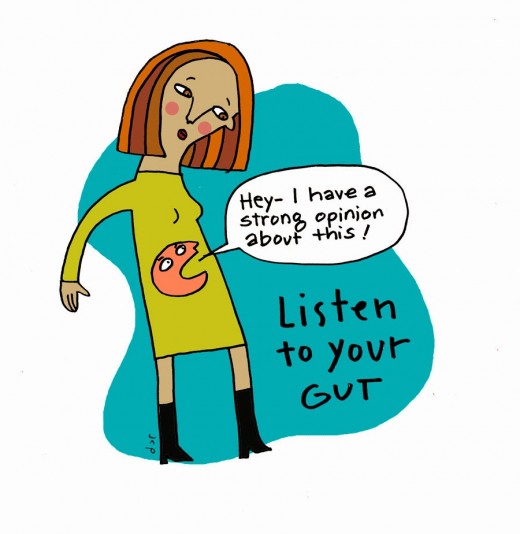
by Tanya Keam | Sep 26, 2018 | Acupuncture, Anxiety, Chinese medicine, Client information, DIY Wellness Tips, Emotions, Gut flora, Liver Health, Mental health, Rest, Sleep, Sunshine coast, Uncategorized
Have you ever experienced a ‘gut feeling’? Sometimes accompanied by butterflies in your stomach, a strange feeling in your abdomen or food isn’t digesting well because life has been a bit h E c T i C? We’ve all been there – someone’s energy doesn’t sit right with us, eating on the run or while multitasking 5 different things, pent up emotions or general daily worry of what to do, what to do.. you’re not alone. I’ve been doing a lot more study around gut-brain connection as well as adrenal health this year and by golly, the 21st century is all about RUSHING. This time of year in October, people start to get tired and stressed with only 2-3 months left until the dramatic Christmas season. Already, people are visiting the clinic worn out and running on their reserves. Just take a moment, to take a deep breath, to check in with where you are at.
Today’s living involves a lot of low level anxiety over multi tasking, relying on coffee/stimulants to wake us up, too rich food, restless sleep, social media, lack of exercise and real fun, financial pressure and general trying to ‘have it all’ or merely keep up. I recently read a book called ‘Slow’ by Brooke McAlary and it is literally about living a slower life. To come back into a state of rest and digest so that sleep is sound and restorative, moods are better, you aren’t relying on coffee/stimulants and you’re recognising your own values and what really matters to you.
Nerve pathways run throughout our body, assisting in all things function. Concentration, digestion, respiration for example are all connected in a linking system. The vagus nerve is the longest cranial nerve that starts in the brain and connects through to our neck and chest, then linking to the abdomen. The vagus nerve is involved with the parasympathetic (rest and digest – when you feel calm and grounded) and the sympathetic (fight-flight – a natural response from stress, when adrenaline kicks in). Both (parasympathetic and sympathetic) are needed to function. Sometimes though, the fight-flight response gets a little overworked – when we push ourselves, when life has thrown us curve balls all at once, pressures of keeping up with everyone else, post traumatic symptoms from trauma and simply feeling anxious and worrying too much. What happens – our gut is affected ! Not to mention pain in the body, fatigue etc.
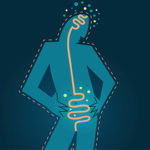
Chinese medicine offers some relieving perspective for easing back into the rest and digest state of being by addressing the pathology at its root. When an issue is rectified at the root level, innate processes within you start to take over in a positive domino effect.
Examples include using acupuncture to:
- Regulate the circadian rhythm (the sleep cycle) so that your hormones and metabolism naturally function well and you wake feeling refreshed, therefore you’re not relying on coffee to perk you up. Not to mention healthy weight and all things gynaecological for woman is smooth sailing throughout monthly cycles.
- Regulate and strengthen your immune and digestive function so that you are absorbing nutrients properly, your bowel movements feel great and your energy is therefore good too!
- Unblock stagnant energy in the body from built up stress, tight muscles, poor posture, repressed emotions and that funny gut feeling when worries build up.
- Supporting your body to prevent overstimulated adrenaline – there is only so many times you can push your adrenals before it becomes detrimental to your health long term.
The vagus nerve doesn’t need to be shocked into shape. It can be toned and strengthened similar to a muscle with small mindful changes to bring you back into feeling cool, calm and collected where you can take a big deep abdominal breath, shaking that funny gut feeling.
Other ways to stimulate the vagus nerve and bring you back into rest and digest ways of being include:
- Gargling – stimulates the palate which is fired by the vagus nerve.
- Singing and chanting – increases the heart rate, sending relaxing vibrational waves through the vagus nerve that passes through the neck.
- Laughing – bursts of joy are natural immune boosters. A good laugh can also be followed by coughing, swallowing and bowel movements which all are connected through where the vagus nerve travels.
- Yoga and Tai chi – both increase the rest and digest activity and studies show regular yoga practices increase the feel good neurotransmitters in the brain.
- Positive social relationships – research has suggested that thinking compassionately about others naturally increases feelings of joy, hope and serenity which therefore increases the heart rate, thus stimulating the vagus nerve in a positive domino effect.
- Deep breathing and meditation – your heart and neck contain neurons that have receptors which detect blood pressure and transmit information to your brain. This activates the vagus nerve that connects through to your heart to lower the heart rate and blood pressure. Breathing the equal amount in as out can be very helpful, and you may even notice you naturally breathe shallowly or mildly hyperventilate which then leads to anxiousness.
- Exercise – shown to stimulate the vagus nerve which then benefits the brain and mental health. As the vagus nerve also connects to digestion, your gut is also stimulated when exercising – increasing blood flow, expanding the diaphragm through breathing and moving pent up stuck emotional stress.
- Colonic hydrotherapy – expanding the bowel increases vagus nerve stimulation and increases the livers detoxifying pathways.
- Bursts of cold – washing your face with cold water stimulates the vagus nerve via temperate change and “always takes the edge off” when you’re in a state of panic, stress or mindlessness. A quick 10 seconds of cold water at the end of your morning hot shower can have a similar effect.
- Learning to CHILL OUT may just be what the doctor ordered. Learning to ‘do nothing’ on weekends, say no to social events when you are tired, and living in a state of your own values and rest.
- Trusting your gut feeling is a good way to intuitively check in with yourself to give you a heads up about whether you’re in rest and digest mode or fight-flight mode. Most relaxing activities will stimulate the vagus nerve, thus bringing you into a natural state of peace.
 Hi, I’m Tanya, an Acupuncturist in Nambour on the beautiful Sunshine Coast, Australia.
Hi, I’m Tanya, an Acupuncturist in Nambour on the beautiful Sunshine Coast, Australia.
I practice Chinese medicine because its safe, logical, relevant and has effectively shown methods of natural wellness for thousands of years. Life doesn’t need to be complicated and nor does the treatment approaches to get people feeling vibrant and well. I’ve seen people gain a lot from treatments, much more than just alleviating symptoms. It’s exciting to connect with people and share deep wisdom from the classics of ancient and traditional medicine, with modern protocols for todays mind-body living. See you in the clinic !

by Tanya Keam | Nov 2, 2017 | Acupuncture, Anxiety, Body clock, Chinese medicine, Client information, Daily Rituals, DIY Wellness Tips, Immune system, Insomnia, Mental health, Nambour, Sleep, Stress
The impact of Insomnia on your health
Poor sleep leads to a host of concerns affecting both health and lifestyle. Such as:
- Mental health issues such as anxiety and depression
- Obesity and poor metabolism
- Heart disease
- Hypertension (high blood pressure) from the increased impact on cardiovascular health
- Lack of concentration
- Poor productivity
- Fatigue
- Low Immunity
How to manage insomnia with Chinese Medicine and natural remedies
In Traditional Chinese Medicine the 24 hour day is viewed in 2 hour blocks – such as 7-9am is when the energy of your stomach is the strongest (breakfast time!). 1-3am is liver time (when life is a bit stressful it impacts the liver so you’re awake thinking about the world’s problems at 2.30am).
If you are having trouble falling asleep, staying asleep, are restless, having unpleasant dreams or relying on sleeping tablets then consider some lifestyle adjustments listed below:
- Go to bed at the same time every night and before 10.30pm. Why? Our bodies have a sleep cycle every 90 minutes within a 24 hour day. Missing the window to fall asleep such as at 9.30pm, it is most likely that you will be awake until the next sleep cycle 90 minutes later.
- Avoid/reduce over-stimulating food such as hot peppers, alcohol, and coffee that overstimulate the nervous system causing an imbalance in the liver.
- Drink chrysanthemum tea – A light yellowish flower that has been used for thousands of years in Traditional Chinese Medicine for insomnia and liver health. Other sleepy time teas are also helpful – lavender, spearmint, hops and camomile.
- Get acupuncture to improve the quality of your sleep and general maintenance of your health and wellbeing. Acupuncture also puts our body back into the ‘rest and digest’ (parasympathetic state) where healing, proper rest and feelings of wellbeing reside. A 2016 study showed that “Acupuncture compared to sham/placebo and pharmacotherapy showed statistically significant results in a systematic review for sleep quality in people with insomnia, with further studies need to support the efficacy of acupuncture for sleep”.
- Herbal medicine prescribed by a registered practitioner. Herbs can be very powerful sleep aids that don’t tend to have the same issues with side effects as more conventional pharmaceuticals.
- Remove electronics from your room, as well as turning off bright lights such as the blue light on your phone/ipad 1 hour before bed.
- Do regular exercise, both high intensity and low impact. Preferably in the morning as afternoon evening exercise can keep you awake from all of the endorphins flowing. Sunshine in your eyes also activates Melatonin (a hormone that regulates sleep and wakefulness).
- Try a mediation and/or yoga class to bring awareness to your self. Both are fantastic for clearing your head and breathing into your abdomen – it will help bring your attention away from anxious thoughts. Both are considered “a practice”, meaning you make them a regular part of your life.
- Avoid icy cold drinks. According to Traditional Chinese Medicine your body has to work extra hard to heat up the icy cold water you are drinking, which is also over-stimulating your body to cause you to stay awake.
- Walk around barefoot will naturally get you feeling grounded and reconnects you with yourself. In Chinese Medicine, massaging the meridian points on the feet are correlated with sleep.
- Write down your thoughts/to-do lists before bed or earlier on in the day so that if you do wake up during the night, your mind doesn’t automatically start thinking about all the things that need doing the next day, week, month.
- Clean your sleep environment – declutter, dust and dirt removal, clean bed linen regularly and don’t sleep with your pets. Cats are known for running around the house at 2am!
- Manage other health concerns – sleep disturbances due to pain, itching, asthma or other breathing disturbances are not considered true insomnia. These issues must be treated to allow a restful night’s sleep.
 Hi, I’m Tanya, an Acupuncturist and Chinese Medicine practitioner in Nambour on the Sunshine Coast, Queensland Australia. I practice Chinese medicine because its safe, logical, relevant and has effectively shown methods of natural wellness for thousands of years (read more about my training here). Life doesn’t need to be complicated and nor does the treatment approaches to get people feeling vibrant and well. I’ve seen people gain a lot from treatments, much more than just alleviating symptoms. It’s exciting to connect with people and share deep wisdom from the classics of ancient and traditional medicine, with modern protocols for todays mind-body living. See you in the clinic !
Hi, I’m Tanya, an Acupuncturist and Chinese Medicine practitioner in Nambour on the Sunshine Coast, Queensland Australia. I practice Chinese medicine because its safe, logical, relevant and has effectively shown methods of natural wellness for thousands of years (read more about my training here). Life doesn’t need to be complicated and nor does the treatment approaches to get people feeling vibrant and well. I’ve seen people gain a lot from treatments, much more than just alleviating symptoms. It’s exciting to connect with people and share deep wisdom from the classics of ancient and traditional medicine, with modern protocols for todays mind-body living. See you in the clinic !
For more information about how I can assist your health and manage insomnia with Chinese medicine, you can contact me or you can now book online.
Research:
- JL Shergis, X Ni, M L.Jackson et al. A systematic review of acupuncture for sleep quality in people with insomnia, Complementary Therapies in Medicine, Vol 26, June 2016, p 11.20.
- Gao, Xiyan, Cuixiang Xu, Peiyu Wang, Shan Ren, Yanli Zhou, Xuguang Yang, and Ling Gao. “Curative effect of acupuncture and moxibustion on insomnia: a randomized clinical trial.” Journal of Traditional Chinese Medicine 33, no. 4 (2013): 428-432.

by Tanya Keam | Apr 19, 2017 | Acupuncture, Authentic self, Chinese medicine, Client information, Daily Rituals, DIY Wellness Tips, Emotions, Exercise, Exercise routine, Fitness, Holidays, Joint pain, Mental health, Motivation, Muscle pain, Nambour, Nature, Nourishing, Rehabilitation, Stress, Sunshine coast, Travel, Wellness
How many types of exercises can you list? Tonnes right?
Walking, jogging, weight training, pilates, swimming, yoga, boxing, martial arts, trekking, tennis, snowboarding, gymnastics, basketball, crossfit.. the list goes on!
Who else gets bored at the gym? Have you ever wanted to try a new type of exercise or are you sick of the same environment where you have been exercising? it can lead to lack of motivation for sure!
My general fitness routine consists on swimming, running, yoga and a bit of resistance training. Yet with these 4 I was bored and felt unmotivated to get out there. So, I decided to change things up. I’ve been to the Himalayan Mountains and one trek was a 10km return at 2,828 meters, so looking more close to home I recently climbed a mountain in the Glasshouse Mountains that I hadn’t already climbed. The mighty Mount Beerwah at 556 meters (1,824 ft), the highest of the 10 volcanic plugs in the region, and more like 2 hours, not 10! It had recently re-opened in January 2017 after being closed and doesn’t cost anything – bonus!
The climb wasn’t about how many laps I could swim or what my pace was in running, it was about trying something new, getting outside in the sunshine and fresh air, but most importantly to challenge myself as it’s a steep climb. Oh and don’t let age define what you can and cannot do. I passed a 70 year old couple on the mountain, taking it slow but doing it! I must advise, if you are new to mountain climbing or bush walking then start with a smaller mountain like Ngun Ngun or Mount Coolum that are very popular to climb on the Sunshine Coast.
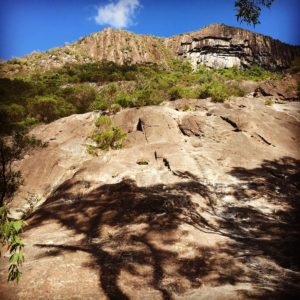 What did I get out of the climb? First of all, 2 hours of fresh Autumn crisp air, sunshine sunshine sunshine, elements of conquering fear when I thought I couldn’t climb any further as my legs were jelly and the top seemed so far away. I also had such a clear head space – I wasn’t thinking about last week or tomorrow, I was right there trying to find the next step to go higher while breathing heavily. Reaching the summit was tough but I did it and felt stoked with my achievement. Coming down was quicker and lots of sliding. Thank god I had good trekking shoes on to grip the rock face, and I was wearing gloves to protect my hands! At the bottom, I ended up with ripped pants and a few cuts but god did I feel on top of the world! I conquered the mother of mountains but also myself !
What did I get out of the climb? First of all, 2 hours of fresh Autumn crisp air, sunshine sunshine sunshine, elements of conquering fear when I thought I couldn’t climb any further as my legs were jelly and the top seemed so far away. I also had such a clear head space – I wasn’t thinking about last week or tomorrow, I was right there trying to find the next step to go higher while breathing heavily. Reaching the summit was tough but I did it and felt stoked with my achievement. Coming down was quicker and lots of sliding. Thank god I had good trekking shoes on to grip the rock face, and I was wearing gloves to protect my hands! At the bottom, I ended up with ripped pants and a few cuts but god did I feel on top of the world! I conquered the mother of mountains but also myself !
Soaking in an epsom salt bath that night as I knew I would be sore from using VERY different muscles that I had been using, all I could think of was what I could do next to add to my fitness regime and to challenge myself. What did I do? I looked for a bigger mountain – Mount Warning at 1,156 meters! Then I started planning my next break to go snowboarding. Why? Because I haven’t done it and life is about experiences!
So if you are feeling unmotivated with doing fitness and then feel guilty for not doing it, try something new, especially something outdoors. Mountain climbing, a game of tennis, join a team sport or a outdoor bootcamp. Just try it. Trust me, you will love it!
TK xx
Tanya Keam Wellness is an experienced health clinic in Nambour on the Sunshine Coast. Helping you to feel better in all aspects of your health and wellbeing.
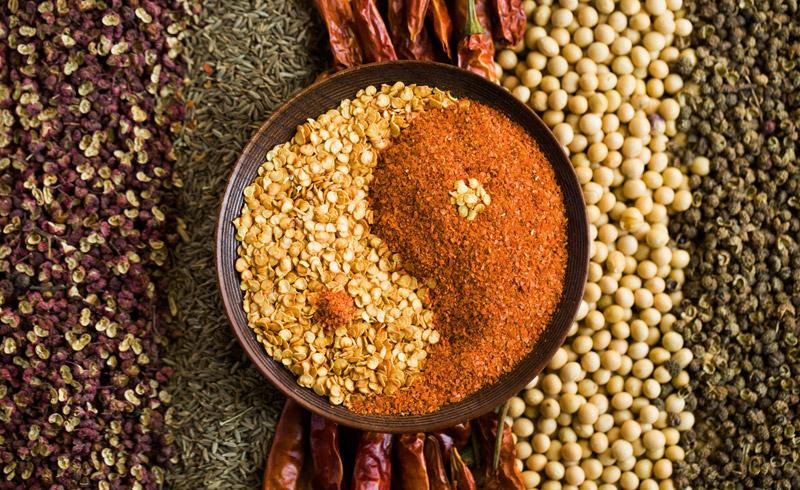
by Tanya Keam | Mar 22, 2017 | Acupuncture, Chinese medicine, Client information, Daily Rituals, Deficiency, DIY Wellness Tips, Emotions, Fertility, fertility acupuncture, Food, Herbal remedies, Hormones, Menstrual cycle, Mental health, Nambour, Nourishing, Nutrition, pregnancy, Stress, Sunshine coast, Wellness, Womens health, Yin
Have you heard of Yin and Yang?
In Chinese philosophy, yin and yang describe how seemingly opposite or contrary forces may actually be complementary, interconnected, and interdependent in the natural world, and how they may give rise to each other as they interrelate to one another. Many tangible dualities (such as light and dark, fire and water, expanding and contracting) are thought of as physical manifestations of the duality symbolized by yin and yang.
Yin qualities include:
Darkness, moon, feminine, shade, quiet, inward
Yang qualities include:
Light, sun, masculine, brightness, loud, outward
Example include:
Night (yin) and day (yang)
Yoga exercise (yin) and boxing exercise (yang)
Yin represents the energy that is responsible for moistening and cooling bodily functions. When this energy is depleted your body begins to show signs of “heating up”. This is not a true heat such as a fever, but rather a lack of the moistening and cooling functions that are necessary to maintain a healthy balance.
Women are more yin, while men are more yang – for example yin is all of the fluids in the body for women (breast milk, menstruation, vaginal discharge/lubricant) – men don’t have this. Men do have some yin qualities, as well as women having some yang qualities.
This post is focused on yin foods, thus nourishing the body and rebalancing conditions. These can include dry skin, menopausal hot flushes, tendon and ligament tightness or flaccidity, vaginal dryness, lack of breast milk production, low libido, insomnia, feeling low, scanty menstruation, hot hands and feet, constipation, dull headaches or anxiety.
Why is your yin imbalanced? Well, lots of reasons – genetics, age, stress on the body, trauma, blood loss, excess sexual activity, recreational drug use, too many yang hot foods, poor diet and lifestyle to name a few.
Nutrition is a simple way to balance yin and yang. Yin foods are cool and expanding; Yang foods are warm and contracting. Think of a shell of iceberg lettuce (Yin), and now a chunk of beef steak (Yang), and you will instantly recognise this meaning.
Foods to nourish Yin include:
- Grains: barley, millet
- Vegetables: alfalfa sprout, artichoke, asparagus, kelp, mung bean sprout, pea, potato,seaweed,string bean, sweet potato, tomato, water chestnut, yam, zucchini
- Fruit: apple, apricot, avocado, banana, lemon, lime, mango, mulberry, pear, persimmon, pineapple, pomegranate, watermelon
- Beans: adzuki, black beans, black soya, kidney, lima, mung
- Bean Products: tofu
- Nuts and seeds: coconut milk, sesame seed, black sesame seed, walnut
- Fish: fish in general but especially clam, fresh water clam, crab, cuttlefish, oyster, octopus, sardine
- Meat: beef, duck, goose, pork, pork kidney, rabbit
- Dairy: cheese, chicken egg, cow’s milk, duck egg
- Herbs and spices: marjoram, nettle
- Oils and condiments: honey, malt,
Common supplements: Ginseng, royal jelly
Examples of every day foods that can be used to build yin, include:
- Fruit smoothies with honey and banana or a fruit salad
- Fish dishes with coconut milk
- Omelettes with cheese
- Asparagus and egg salads with sesame seeds
- Tacos made with Kidney beans and topped with a small amount of cheese
- Baked Potato stuffed with tofu with soya sauce and sesame seeds.
- Pork and apple dishes
- Miso soup with tofu and seaweed
Foods to avoid:
- Stimulating foods such as the following will only further deplete yin: caffeine, alcohol, sugar and strongly heating, pungent spices.
Note: Like yin tonifying herbs, yin building foods have a tendency to congest the digestive organs and promote stagnation if large amounts are consumed. It is therefore important to consume small quantities frequently rather than large helpings irregularly. Such as a large portion if a fish coconut curry late at night is not ideal as it will sit in your stomach, stagnate and not digest properly before bed. Thus a small portion between 5-6pm is more ideal as there is more time before you go to bed to digest it.
Also, It’s not to say that yang foods you already consume such as roast chicken, other types of fish, coffee, tea, black pepper etc are to be completely avoided. Remember yin and yang balance each other out, are contrary forces that are actually complementary, interconnected, and interdependent of each other.
Other yin tips: meditate; eat more fresh fruit and salads; drink more water, teas and juices; wear pastel colors; wear loose, flowing clothes; stretch; get out into nature; listen to relaxing music; light candles at night.
Take care of you, see you in the clinic,
TK xx
Tanya Keam Wellness is an experienced health clinic in Nambour on the Sunshine Coast. Helping you to feel better in all aspects of your health and wellbeing.
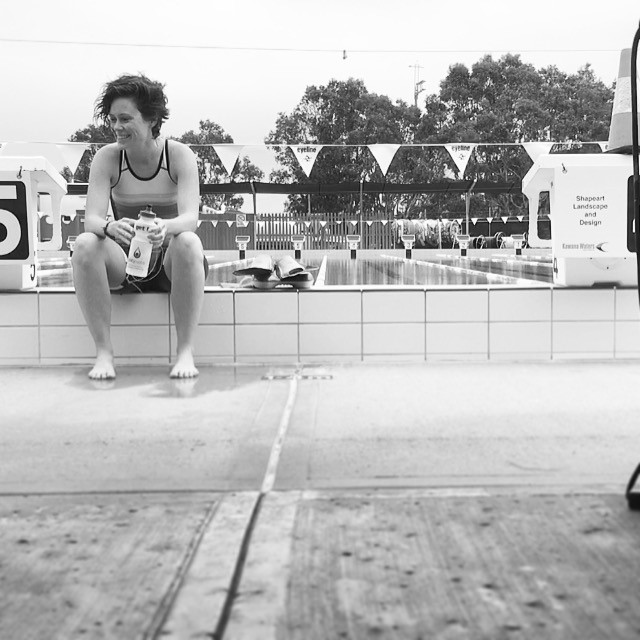
by Tanya Keam | Oct 24, 2016 | Acupuncture, Chinese medicine, Client information, Daily Rituals, DIY Wellness Tips, Exercise, Fitness, Immune Support, Liver Health, Mental health, Nambour, Nature, Nutrition, Seasonal living, Spring, Stress, Sunshine coast, Wellness
We live in one of the most fittest and healthiest places in Australia. We often have triathlon events, surfers at Noosa, runners on Alex hill, mountain climbers on Ngun Ngun, dog walking at Kawana and health cafes popping up everywhere. Who wants to stay inside on a sunny weekend? NO ONE!
Spring is the season of regeneration and growth and connects to the liver organ. The days become longer and we want to spend more time outside, especially living on the beautiful Sunshine Coast!
Here are some tips and strategies fitness wise and to support liver health:
From a Western medicine perspective, the liver is a very important organ that stores blood, produces bile, processes toxins and aids in our immune function.
From a Chinese medicine perspective, it also has a major influence on the smooth flow of energy (life force) to move throughout our bodies. When something blocks this energy flow such as lack of exercise, stress, pent up emotions or an unhealthy lifestyle; the liver becomes agitated/blocked/stuck, which can lead to symptoms such as irritability, insomnia, PMS, tight muscles, mood swings, digestive discomfort, pain in the body and headaches.
So what can you do to your liver energy/life force to flow smoothly in the face of every day activities?
Exercise: The best way to get your energy moving is to move! Different types of exercise suit different people. Some people do really well with vigorous exercise such as long runs or high intensity interval training (HIIT), while other people are more suited to slower, gentle forms of movement such as walking or yoga. I have personally found a mix of both types of exercise to be beneficial. If the gym is a bore, then find something you enjoy, it might even be a group fitness class where you can meet new people. This spring I’m into swimming, yoga, running and resistance exercises. Get those endorphins flowing !!!!
Diet: It is important to eat foods that will cleanse and improve overall liver function. Sour flavours belong to the liver/gallbladder function. Having a squeeze of lemon in warm water first thing in the morning invigorates the liver to get moving for the day and vinaigrette dressings can be added to salads. Leafy greens such as kale, lettuce, spinach and chard support liver detoxification pathways. Artichokes contain a flavonoid which is a strong antioxidant – meaning prevention and cleansing of free radical damage to cells. Try to reduce the amount of dairy, alcohol, greasy and deep fried foods, and excessive salt.
Manage stress – Stress plays a part in all of our lives, and a small amount is healthy, but its just how we manage it all that counts. Dealing with issues, conflict in relationships, pent up emotions, work situations etc. Seek professional support if needed but otherwise have a ‘self care’ approach to your day to day lives. Rest when you need to, have health treatments such as acupuncture or massage, exercise, take moments to be in nature and soak up some vitamin D, express how you feel, plan your day and week ahead.
It’s the little things that count. See you in the pool!
Take care,
TK x
Tanya Keam Wellness is an experienced health clinic in Nambour on the Sunshine Coast. Helping you to feel better in all aspects of your health and wellbeing.
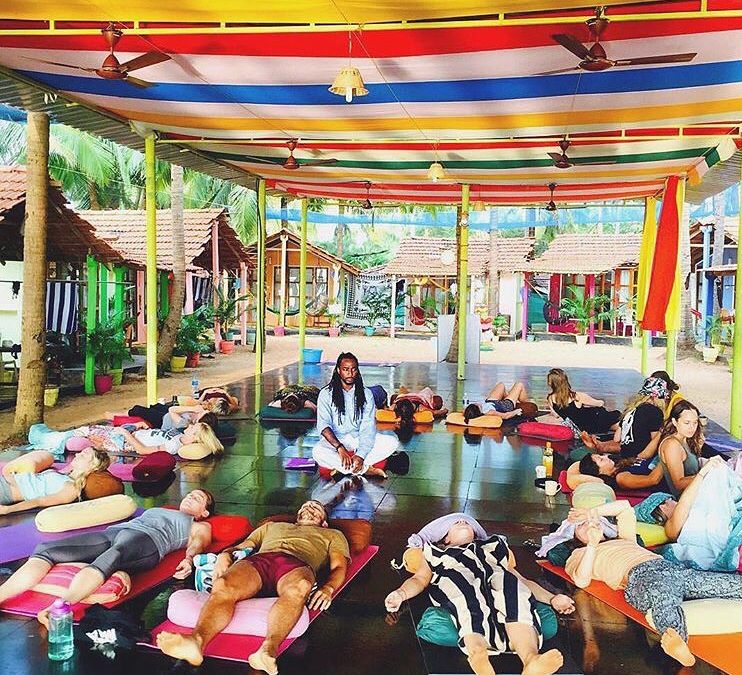
by Tanya Keam | Sep 12, 2016 | Authentic self, Client information, Daily Rituals, DIY Wellness Tips, Emotions, Exercise, Mental health, Muscle pain, Nambour, Rehabilitation, Sleep, Spiritual growth, Stress, Wellness, Yoga
Why I recommend Yoga
I was lucky enough to spend time in India doing my yoga teacher training with people from all walks of life. Yoga includes breath control, simple meditation, and the adoption of specific bodily postures, for health and relaxation.
Yoga can improve all areas of you health and wellbeing
Yoga is simply about connecting with yourself through mindful exercise, using breath. Just because you cant touch your toes or get yourself into bizarre postures that yoga pictures are known for, doesn’t mean the practice of yoga cannott improve your life. Start with a simple beginner class once a week to learn some simple postures and breathing techniques and then go from there!
You can benefit from:
Well rested sleep
Increased circulation
Better flexibility
Better posture
Improved balance
More strength
A toned body
More energy
Head clarity
Relaxation and peace
Pregnancy discomfort and birth preparation
Better sex
Lower blood pressure
Increased lymph flow
Increased metabolism
Better digestion
Reduced pain
Improvement for other sports
Better respiration
Reduced stress and anxiety
An inner calmness
Improve your outlook on life
A better connection with yourself – physically, mentally, emotionally, spiritually
There are MANY styles of yoga classes all over the Sunshine Coast – just try a few and see which teacher and class best suits you.
Take care of you, see you in the clinic,
TK xx
Tanya Keam Wellness is an experienced health clinic on the Sunshine Coast. Helping you to feel better in all aspects of your health and wellbeing.

 anya, an AHPRA registered Acupuncturist and health practitioner in Nambour in the Sunshine Coast hinterland, Queensland Australia. I practice Chinese medicine because its safe, logical, relevant and has effectively shown methods of natural wellness for thousands of years (read more about my training here). Life doesn’t need to be complicated and nor does the treatment approaches to get people feeling vibrant and well. I’ve seen people gain a lot from treatments, much more than just alleviating symptoms. It’s exciting to connect with people and share deep wisdom from the classics of ancient and traditional medicine, with modern protocols for todays mind-body living. See you in the clinic !
anya, an AHPRA registered Acupuncturist and health practitioner in Nambour in the Sunshine Coast hinterland, Queensland Australia. I practice Chinese medicine because its safe, logical, relevant and has effectively shown methods of natural wellness for thousands of years (read more about my training here). Life doesn’t need to be complicated and nor does the treatment approaches to get people feeling vibrant and well. I’ve seen people gain a lot from treatments, much more than just alleviating symptoms. It’s exciting to connect with people and share deep wisdom from the classics of ancient and traditional medicine, with modern protocols for todays mind-body living. See you in the clinic ! 












